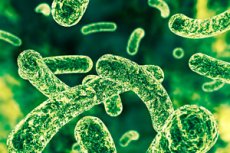Nye publikasjoner
Tarmbakterier forsterker effekten av immunterapi mot kreft
Sist anmeldt: 02.07.2025

Alt iLive-innhold blir gjennomgått med medisin eller faktisk kontrollert for å sikre så mye faktuell nøyaktighet som mulig.
Vi har strenge retningslinjer for innkjøp og kun kobling til anerkjente medieområder, akademiske forskningsinstitusjoner og, når det er mulig, medisinsk peer-evaluerte studier. Merk at tallene i parenteser ([1], [2], etc.) er klikkbare koblinger til disse studiene.
Hvis du føler at noe av innholdet vårt er unøyaktig, utdatert eller ellers tvilsomt, velg det og trykk Ctrl + Enter.

Omtrent én av fem kreftpasienter drar nytte av immunterapi, en behandling som bruker immunforsvaret til å bekjempe kreft. Tilnærmingen har vist betydelig suksess i behandling av lungekreft og melanom. I håp om potensialet utforsker forskere strategier for å forbedre immunterapi for kreftformer som ikke responderer godt på den, med mål om å hjelpe flere pasienter.
Nå har forskere ved Washington University School of Medicine i St. Louis funnet ut at en stamme av tarmbakterier, Ruminococcus gnavus, kan forsterke effekten av kreftimmunterapi hos mus. Studien, publisert i tidsskriftet Science Immunology, tilbyr en ny strategi for å bruke tarmmikrober til å frigjøre det uutnyttede potensialet til immunterapi for å bekjempe kreft.
«Mikrobiomet spiller en viktig rolle i å mobilisere kroppens immunsystem til å angripe kreftceller», forklarte seniorforfatter av studien, Marco Colonna, MD, professor i patologi ved Robert Rock Bellivu.
"Våre funn kaster lys over én type tarmbakterier som hjelper et immunterapilegemiddel med å drepe svulster hos mus. Å identifisere disse mikrobielle partnerne er et viktig skritt i utviklingen av probiotika som kan forbedre effektiviteten til immunterapilegemidler og være til fordel for flere kreftpasienter."
Kreftimmunterapi bruker kroppens immunceller til å målrette og ødelegge svulster. En slik behandling bruker immunkontrollpunkthemmere for å fjerne de naturlige bremsene som holder immun-T-cellene stille, og forhindrer skade på kroppen. Noen svulster motvirker imidlertid dette ved å undertrykke de angripende immuncellene, noe som gjør disse hemmerne mindre effektive.
Colonna og første medforfatter Martina Molgor, PhD, etablerte tidligere et samarbeid med kollega Robert D. Schreiber, PhD, der de fullstendig utryddet sarkomer hos mus ved hjelp av en todelt inhibisjonsmetode.
Forskerne hemmet TREM2, et protein produsert av tumormakrofager, for å hindre T-celler i å angripe den voksende svulsten. De viste deretter at immunterapimedisinen var mer effektiv når TREM2 ble blokkert. Resultatet indikerte at TREM2 reduserte effektiviteten av immunterapien.
I eksperimentet som dannet grunnlaget for den nye studien, gjorde forskerne en overraskende observasjon. Mus uten TREM2 viste en lignende positiv respons på kontrollpunktshemmeren da de ble plassert sammen med mus som hadde proteinet. Dette resultatet oppsto da forskerne avvek fra sin vanlige protokoll med å separere musene før de ble behandlet med hemmeren.
Samliv hos mus fører til utveksling av mikrober. Forskerne spekulerte i at effektene kan skyldes utveksling av tarmbakterier.
Forskerne samarbeidet med Jeffrey I. Gordon, MD, PhD, og første medforfatter Blanda Di Lucia, PhD, for å studere mikrober i tarmen til mus som ble behandlet med immunterapi. De fant en økning i Ruminococcus gnavus sammenlignet med fraværet av slike mikrober hos mus som ikke responderte på behandlingen.
R. gnavus er funnet i tarmmikrobiomet til kreftpasienter som responderer godt på immunterapi, forklarte Colonna. I kliniske studier hjalp avføringstransplantasjoner fra slike pasienter noen ikke-respondere med å dra nytte av immunterapi.
Forskerne, inkludert første medforfatter og masterstudent Daria Khantakova, injiserte R. gnavus i mus og behandlet deretter svulstene med en kontrollpunktshemmer. Svulstene krympet selv når TREM2 var tilgjengelig som et våpen for å redusere effektene av immunterapien.
Gordon, direktør for Edison Family Center for Genome Sciences and Systems Biology, bemerket at økende bevis tyder på at mikrobiomet forbedrer immunterapi. Å identifisere relevante arter, som R. gnavus, kan føre til utvikling av neste generasjons probiotika som kan virke synergistisk med immunterapi for å forbedre kreftbehandlingen.
Forskerne tar nå sikte på å forstå hvordan R. gnavus fremmer avstøting av svulster, noe som kan avdekke nye måter å hjelpe kreftpasienter på. Hvis mikroben for eksempel produserer en immunaktiverende metabolitt under fordøyelsesprosessen, kan dette åpne for muligheten for å bruke metabolittene som immunterapiforsterkere.
Mikrober kan også komme inn fra tarmen og utløse en immunrespons i svulster eller aktivere intestinale T-celler, som deretter migrerer til svulsten og starter et angrep, sa Colonna. Forskere utforsker alle tre mulighetene.
